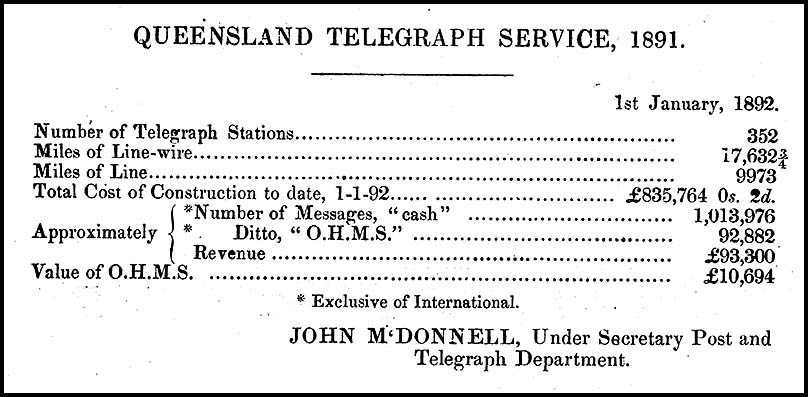Overview of developments.
- Australia 1901-1988
- New South Wales
- Overview of NSW
- Telegraph lines
- Telegraph Offices
- Date stamps
- Forms
- Envelopes
- Instructional annotation
- Collect
- Delayed
- Free
- Immediate Urgent
- Reply paid
- Rates
- Stamps
- 1871 Telegraph stamps
- 1885 proposal
- 1893 proposal
- Queensland
- South Australia
- Tasmania
- Victoria
- Western Australia
- International
- Special aspects
Summaries are provided below for:
- construction of the major telegraph line initiatives;
- milestones in the Legislation for and the administration of the Telegraph Department in Queensland;
- the dates for new developments in telegraph forms and date stamps;
- extent of usage of the telegraph lines -
domestic use;
early international use.
To access copies of original documents, including Annual Reports, etc, see the list elsewhere.
| 13 April 1861 | First telegraph line - Brisbane to Ipswich. |
| 9 November 1861. | First line to New South Wales (via Ipswich and Tenterfield). |
| 15 October 1893 | Noumea to Bundaberg cable opened. |
| 31 October 1902 | Pacific Cable from Vancouver to Southport. |
| 22 November 1860 | The position of Inspector of Telegraphs and Supervisor of Telegraphic Works was created within the Post and TelegraphJ. J. Austin appointed. |
| First telegraph legislation - The Electric Telegraph Bill. CHECK | |
| April 1863 | W. J. Cracknell promoted to General Superintendent of Electric Telegraphs from his position as Station Master at the Ipswich Electric Telegraph Office. His appointment followed the death of Mr. Austin, the former Superintendent. |
| 1872 | The Post & Telegraph Act and the The Telegraphic Messages Act of 1872. |
| 1879 | Electric Telegraph Department merged with the Postmaster-General's Department. |
| 1 January 1880 | An Urgent rate for telegrams was introduced. |
| September 1880 | Post Card and Postal Note Act authorising the issue of Postal Notes (QC-TO-4). |
| 1891 | The Post and Telegraph Act 1891- repealed the 1872 Act. |
| 1 March 1901 | Post and Telegraph Department ceased operation when responsibilities assumed by the Commonwealth. |
See elsewhere for a list of the names for the Telegraph Department and the Officers in charge 1860 - 1964.
| Earliest recorded forms: | |
| Transmission form: | Used for a message from Brisbane to Ipswich on 6 April 1870 (QC-TO-1). |
| Delivery form: | 25 September 1862 (QC-DO-1). |
| Delivery envelope: | 16 April 1867 (Brisbane to London) - (QC-EO-1). |
| Earliest recorded Urgent rate form (for any Colony). |
24 August 1892 (QC-DU-1). |
| Earliest use of an oval Electric Telegraph date stamp: | 29 March 1888 at Thursday Island. These date stamps rarely have dates. |
| Earliest use of a Telegraph Office date stamp: | Telegraph Office Brisbane. |
Basic data are included elsewhere.
(a) Electric Telegraph stations.
| After the establishment period from 1861 to 1864, the number of Electric Telegraph Stations in Queensland increased from 7 to 11.
The stations opened in 1861-64 were: Ipswich, Toowoomba, Warwick, Drayton, Gatton, Lytton, (Moreton Island Pilot Station), Cape Moreton, Hawkwood, Rockhampton, Gladstone and Tenterfield (NSW). During the period 1865 to 1876, an average of about 9 stations were opened each year while from 1877 to 1888, this average increased to about 16 stations each year. |
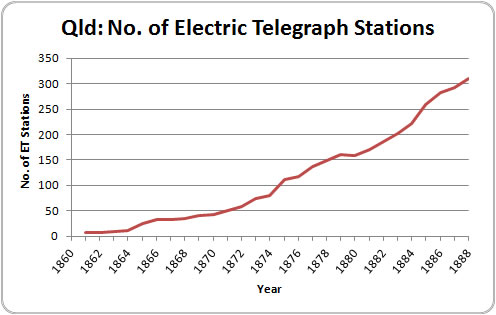 |
(b) Messages sent or received.
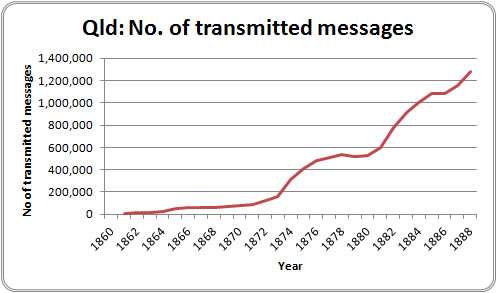 |
|
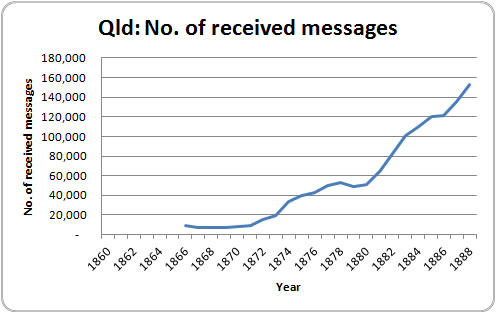 |
An Extract from the 1892 Intercolonial Postal and Telegraphic Conference held in Hobart during March 1892 included the followng summary for Queensland on page 86:
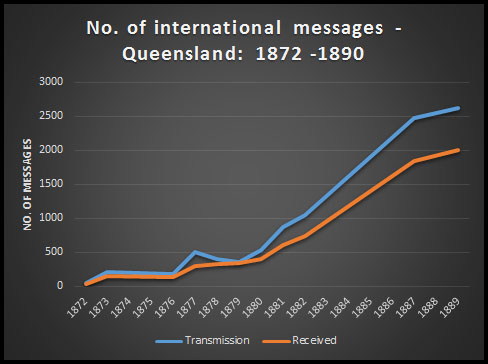 |
After telegraphic connection was made to complete the line from Adelaide to Europe, the demand for the international service grew steadily - despite the high rates charged.
The graph shows a constant rise in demand especially after the 10s 6d. per word rate was introduced in 1876 although there is a more rapid increase in the transmissions than in the received messages. The data on which the graph is based are included elsewhere. |
